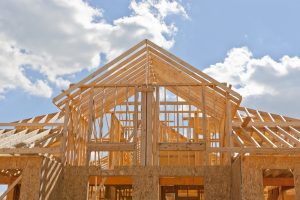
Building a new home may seem like a complex and daunting undertaking but your mortgage doesn’t have to be. This particular blog post will discuss and highlight some of the key stages of a progress mortgage and what you should be prepared for. A progress draw mortgage can be utilized under two different building scenarios:
1st: A Self Built Home – You are acting as a general contractor and hiring trades. You may also be doing some of the work yourself.
2nd: You’ve hired a contractor to build a home on a lot which you own and they require advances throughout the construction process.
A progress advance mortgage is exactly what it sounds like…rather than receiving your full mortgage in one lump sum, a construction mortgage is advanced in intervals as the house is being built. There are usually three or four draws (advances) at 19%, 45%, 75%, and 100% completion. Each advance will require a progress inspection report, which will note the percentage completed prior to the advancement of funds.
It is always important to meet with your Mortgage Broker anytime you are thinking about mortgages…but it is especially important when thinking about a Progress Advance Mortgage as there is a large number of details that need to be considered and ironed out early in the process. For instance, the advances always happen at the end of a phase of construction. As such, there may be expenses that you may need to carry until that stage’s advance is released. This makes planning cash flow for your construction project very important.
So what are the typical stages?
Advance: Land/Foundation Preparation
The first phase of the building project is where you will be breaking ground to lay the foundation of your new home. Although some lenders will vary, typically during this stage the foundation is poured and back filled. Once complete, your Mortgage Broker will work with you to coordinate the inspection and advance.
Advance: Lock Up Stage
The second phase of the building project is called Lock Up. This is when the structure is complete and the building can be locked up. Meaning that the walls are up, roof is on, windows and doors are installed. Your progress inspection report will typically indicate that your home is 45% completed and you will receive your second advancement of funds.
Advance: Ready for Finishes.
For the third advance stage, the house is ready for the finishing work. So at this point, the dry wall is up, taped and mudded. This means that everything behind the dry wall is done…insulation, wiring, plumbing, etc. The house is ready for the final touches.
Final Advance: 100% Complete.
You’ve made it and survived! That’s right, you are ready to move into your new home. During the final phase, all of the finishing work has been completed. The lighting installed, walls painted, flooring, cabinets and fixtures are all in and ready for you to use. At this stage you will receive the final advance of your mortgage, completing the process with one final progress inspection report.
In closing…
Although there are many decisions to be made when building a home, such as choosing house plans, trim, paint, and so on, we often do not put enough focus on the details of the mortgage. It doesn’t get the attention it demands because it is not as “exciting” as the rest of the process. It is important to make sure that the time is taken to properly understand the mortgage process, advance requirements and the various stages. If you understand this going into the planning and building stages, you will find that the process is much less stressful than it otherwise could have been.
It is also important that you build your team of professionals and that those professionals know who each other are. Building a home involves more than just contractors. You also need to ensure that your insurance agent, realtor, mortgage broker, and lawyer are pulled in at the right stage. They need to know who each other are in the event that they require specific details about the build. Doing your homework and putting the time in upfront to get everything organized will save you headaches during the build.
Happy Building!
